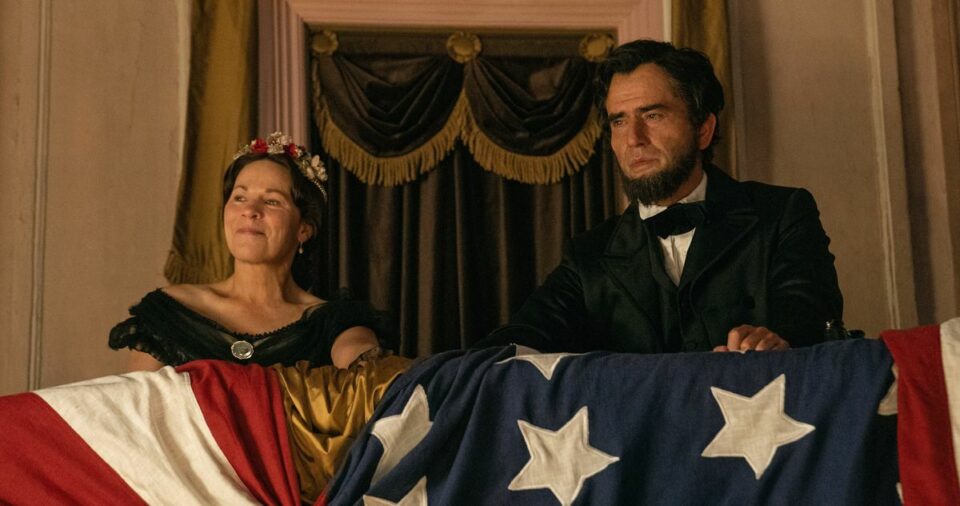There are a few moments in American history that everyone knows about no matter how much they might have napped in school, and the assassination of Abraham Lincoln is high on that list. There’s a good chance, however, that you only remember the basics: Ford’s Theatre, disgruntled actor with Confederate sympathies, maybe a bit about Samuel Mudd and the assassin’s ultimate fate in a fiery barn a few days later. Like the 2006 nonfiction account it adapts, James L. Swanson’s Manhunt: The 12-Day Chase of Lincoln’s Killer, this new miniseries puts this heavily streamlined version of the story in historical context. There’s never been any doubt about who murdered Lincoln. John Wilkes Booth, an actor from a well-known family of actors, leaped to the stage to claim credit. Nor does Manhunt — created by Monica Beletsky, a veteran of Fargo, The Leftovers, Friday Night Lights, and more — play fast and loose with history by inventing a puppet master (though the question of Booth’s connections to the Confederacy remains a central element). It does, however, explore the complexity of the moment and all the forces driving events leading up to and following Lincoln’s assassination. Its overarching thesis isn’t “Everything you know is wrong” so much as “You probably don’t know enough about this famous event, its repercussions, and its continued relevance. Let’s explore.”
Beletsky uses two central figures for this exploration. The first, played by Tobias Menzies (The Crown, You Hurt My Feelings) is Edwin Stanton, Lincoln’s Secretary of War, and a rival turned friend who becomes obsessive in his pursuit of the president’s killer, sometimes jeopardizing his health in the process. The other is Booth himself, played by Anthony Boyle (Masters of the Air, The Plot Against America). It’s Booth we see first, closing his window to the celebratory sounds of a Washington, D.C., filled with those happy to see the end of the war and a victorious Union. Booth knows what they don’t: that the day will be remembered for other reasons.
It’s telling that we first see Booth’s hand with a telltale “JWB” tattoo as he preps in the mirror like a 19th-century Travis Bickle. The series and Boyle’s performance depict him as a consummate egotist, which squares with history. He’s not, as quickly established, a lone gunman. “Round up everybody. It’s a go,” he tells David Herold (Will Harrison), the co-conspirator who accompanied Booth on his flight. But who is everybody? And what, exactly, is “a go”? The wordless scene that follows, set at a Washington boardinghouse, introduces a few key players whose names we’ll soon learn: Mary Surratt (Carrie Lazar), the owner of the boardinghouse; and Lewis Powell (Spencer Treat Clark), who has another assignment that night. The next scene brings in another key player in George Atzerodt (Tommie Turvey), who’s seen receiving a gun from Booth in the lobby of a hotel, though his task will remain unfulfilled.
Though Manhunt follows the search for Booth from its beginning to end, it makes the occasional leap in time, first hopping to a moment 30 minutes before the assassination as Herold and Powell pay a visit to the home of William H. Seward (Larry Pine), Lincoln’s Secretary of State. Already injured by a carriage accident, Seward’s an easy target for Powell’s assassination attempt, even if Powell doesn’t seem to know why he’s supposed to kill him in the first place. Yet, in the bloody melee that follows, Powell fails, fighting with Seward’s servants and family members while Herold makes a timely retreat, leaving his buddy alone at the crime scene. An early suggestion that this may not be the most tightly knit conspiracy in American history, at least at this level.
It’s not until after the title card that we meet Stanton, who’s given the news of the attack on Seward by his son Edwin Stanton Jr. (Brandon Flynn). We also quickly meet Stanton’s wife Ellen (Anne Dudek), who, after being told he’s off to investigate the incident, asks her husband, “Have you ever met a problem you could delegate?” This isn’t the subtlest way to establish Stanton’s character (nor is a subsequent moment in a later scene in which Stanton refuses to have a doctor look after his asthma), but it’s an effective sketch of a character who, like the historical Stanton, seemed compelled to micromanage every problem. (Booth, on the other hand, puts maybe too much trust in others to get the job done.) Stanton’s visit to Seward’s home helps establish the gravity, and the strangeness, of the situation. Whoever broke in wasn’t interested in stealing from Seward, just taking him out.
Another leap in time brings back to the White House five days before Lincoln’s death, where we meet Lincoln himself (Hamish Linklater) who uses a folksy anecdote about a sick girl to explain why the war, in its final days, is “down to raisins.” He’s right, though. They soon receive word of Robert E. Lee’s surrender at Appomattox. The Union has won, at last, a tearful Lincoln tells the room. Stanton seems to take pleasure in the moment, briefly, before an asthma flare-up and the need to compose the news overtake him. He soon brings it to Seward and the two share a laugh about the humiliating circumstances of Lee’s surrender, but Seward offers a warning: The war might be over, but that doesn’t mean everyone on the losing side has given up.
That certainly applies to Booth. A swaggering braggart intent on exploiting his fame for all it’s worth, Booth can freely wander into Ford’s Theatre, where he’s worked and is well known to the staff, but bristles when he realizes his better-known father and brother are up on the wall but he is not. Booth also knows the layout of Ford’s Theatre well, allowing him to creep unnoticed into the balcony where Lincoln and his wife Mary (Lili Taylor) are enjoying the broad comedy of Our American Cousin. Outside, Ned Spangler (Walker Babington), the Ford’s Theatre worker he’s tasked with watching his horse, has subcontracted the job to someone else. (A character we’ll later learn is nicknamed “Peanuts,” played by Daniel Croix.)
Then, the assassination: Manhunt stages the scene with brutal immediacy, watching as Booth waits for just the right moment, pulls the trigger, leaps to the stage, shouts “sic semper tyrannis” to the audience after falling awkwardly on one leg, then exits through the back, the orchestra pit impeding pursuit by any in the audience, even if they could shake off the shock of the moment to give chase. Instead, Booth forces his way out the back, smacks Peanuts with his cane (which he probably feels free to do because Peanuts is Black), and rides off into the night. Manhunt takes some considerable liberties with history, but this moment isn’t one of them. It really happened that quickly and brutally. (It’s probably worth noting here that the great Carl Franklin directs this episode.)
While Stanton continues to investigate the Seward attack, Booth finds himself trapped inside Washington, unable to leave due to the closing of the bridge at 9 p.m. Or at least he would have been trapped if the soldier in charge of enforcing the curfew wasn’t a fan of Booth’s acting and willing to make an exception. He’ll soon find he has bigger obstacles to overcome, however. Reconnecting with Herold in the woods, and still in pain from his broken leg, he knows he needs to find a safe haven and medical attention. Fortunately for him, he knows a guy.
Specifically, Booth knows Samuel A. Mudd (Matt Walsh), a physician/farmer with a spot in Maryland who’d be happy to help. There they’re also waited on by Mary Simms (Lovie Simone), a servant previously enslaved by Mudd who remains in his employ, alongside her brother Milo (Antonio J. Bell). Mary becomes the object of Booth and Herold’s racist, leering insults, which she endures with dignity. It says a lot of Booth and Herold’s mindset that, even after the war’s end, they believe taking these kinds of liberties will have no repercussions.
In Washington, Stanton makes his way to Lincoln only to find that he, too, has been attacked, and is unlikely to survive. Walking into the Petersen House, where the grievously injured Lincoln has been taken, Stanton finds chaos, an angry Robert Lincoln (Maxwell Korn), who doesn’t understand why is father was allowed to attend the play in the first place, and a hysterical Mary, who blames Lincoln’s bodyguard William Parker (Chris Gerard) for the attack on her husband. Parker spent his time conversing with Booth at the bar without a clue to his designs, having been sent away by Lincoln during the play. Stanton also finds Lincoln, positioned diagonally in a bed too small to hold him, obviously near death.
Lincoln dies and the plot thickens. Army Chief Thomas Eckert (Damian O’Hare) brings news that Vice President Andrew Johnson, too, was targeted for assassination. Atzerodt, the German immigrant mechanic to whom he slipped a gun, has lost his nerve, confessed to his would-be crime, and named Booth as his boss. Stanton will soon watch as his friend is carried out in a coffin in the rain, then immediately returns to the case, investigating the crime scene at Ford’s Theatre. It’s there he meets Sanford Conover (Josh Stewart), a reporter for the New York Tribune whose pushiness and tactlessness (to say nothing of the way he asks if Stanton “care more for the rights of the Negro than men like us”) annoys Stanton, who threatens to arrest him. Instead, Stanton throws him a bone, telling him to meet him later at the Petersen house where they’ll have a tense interview during which Stanton tells the reporter, “This is America. We replace our presidents with elections, not coups.” (On the nose? Maybe. Relevant anyway? Certainly.)
For now, it’s his job to reconstruct what happened and talk to witnesses, including Peanuts, who shares a description of Booth’s horse and points them in the direction of Maryland before emotionally insisting he had no idea he was helping an assassin by watching his horse. Stanton’s investigation then takes him to Booth’s hotel room where he finds a coded message. But from whom? And where? Another clue: a $500 deposit into a bank in Montreal, a hotbed of Confederate espionage. So what does this mean? Was Booth acting on his own, or on the orders of a still-active Confederacy intent on toppling the government? And if so, Eckert asks his boss, then what? Stanton’s reply: “I’d have to start another war.”
There’s a lot going on in this first episode of Manhunt, which has to establish all the series’ major players and plot threads while finding a middle ground between historical drama and procedural. Written by Beletsky, the episode does this with admirable efficiency, balancing the investigation with exposition that provides some historical context and, perhaps most importantly, offers some insights into what drives Booth and Stanton. Scenes between Stanton in Lincoln are especially crucial, establishing both as real people with a warm but complicated relationship, not just names from the pages of a history book. It’s also a gripping mystery, even if the culprit is clear from the start. We know how and why Booth did it, but was he pushed? And, if so, who did the pushing?
Clues and Codes
• I am not well versed enough in American history to fact-check every detail of Manhunt (or even most, though I’m reading Swanson’s book alongside the series). I also don’t think absolute historical accuracy is a standard by which to judge a project like this. Beletsky has to streamline and shape the facts into a story; history’s left a lot of blanks that need to be filled for the narrative to work. This first episode diverges in significant spots from its source material for dramatic effect: Booth and Parker never had a conversation over drinks before Lincoln’s assassination, but it’s still one of the episode’s best scenes. And while Booth did bypass a curfew he should never have been allowed to break to make his escape, nothing suggests it was a starstruck fan that let him through. Yet the scene offers some insights into Booth’s character and the tense atmosphere in Washington even before the assassination.
• Beletsky has to make some strong choices and stick with them. For instance, varying accounts have Stanton saying of the deceased Lincoln, “Now he belongs to the ages” and “Now he belongs to the angels.” Like Swanson, she goes with “angels.” Similarly, there’s been much debate about Mudd’s complicity. His descendants protested his innocence for generations, an effort that even brought in the Supreme Court in 2003. (The court refused to hear the case.) Mudd’s been portrayed as an innocent in John Ford’s Prisoner of Shark Island and the Dennis Weaver-starring 1980 film The Ordeal of Dr. Mudd. Similarly, Robert Redford’s 2010 film The Conspirator treats Mary Surratt sympathetically, even if it doesn’t argue conclusively for her innocence. Beletsky allows no such ambiguity. The facts seem to be on her side here, too, but the story wouldn’t work without a strong point of view about who’s responsible.
• One divergence is worth noting, however: Mary Simms would ultimately testify that her boss had Confederate connections, but both Mary and Milo had left Mudd by the time of the assassination.
• Lincoln called Stanton “Mars” after the god of war.
• It now seems like Hamish Linklater can be counted on to play a supporting role in miniseries and just kill every scene in which he appears. (See also Midnight Mass.) Seemingly unthreatened by Daniel Day Lewis’ great performance in Lincoln, he delivers a warm interpretation of Lincoln that only deepens the tragedy.
Keith Phipps , 2024-03-15 05:00:08
Source link


